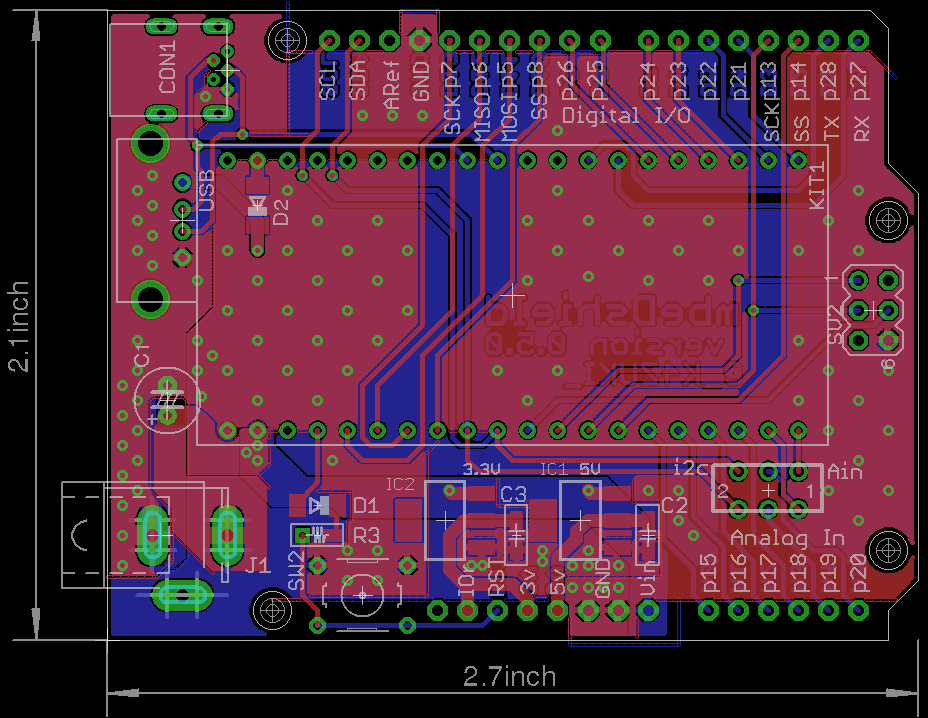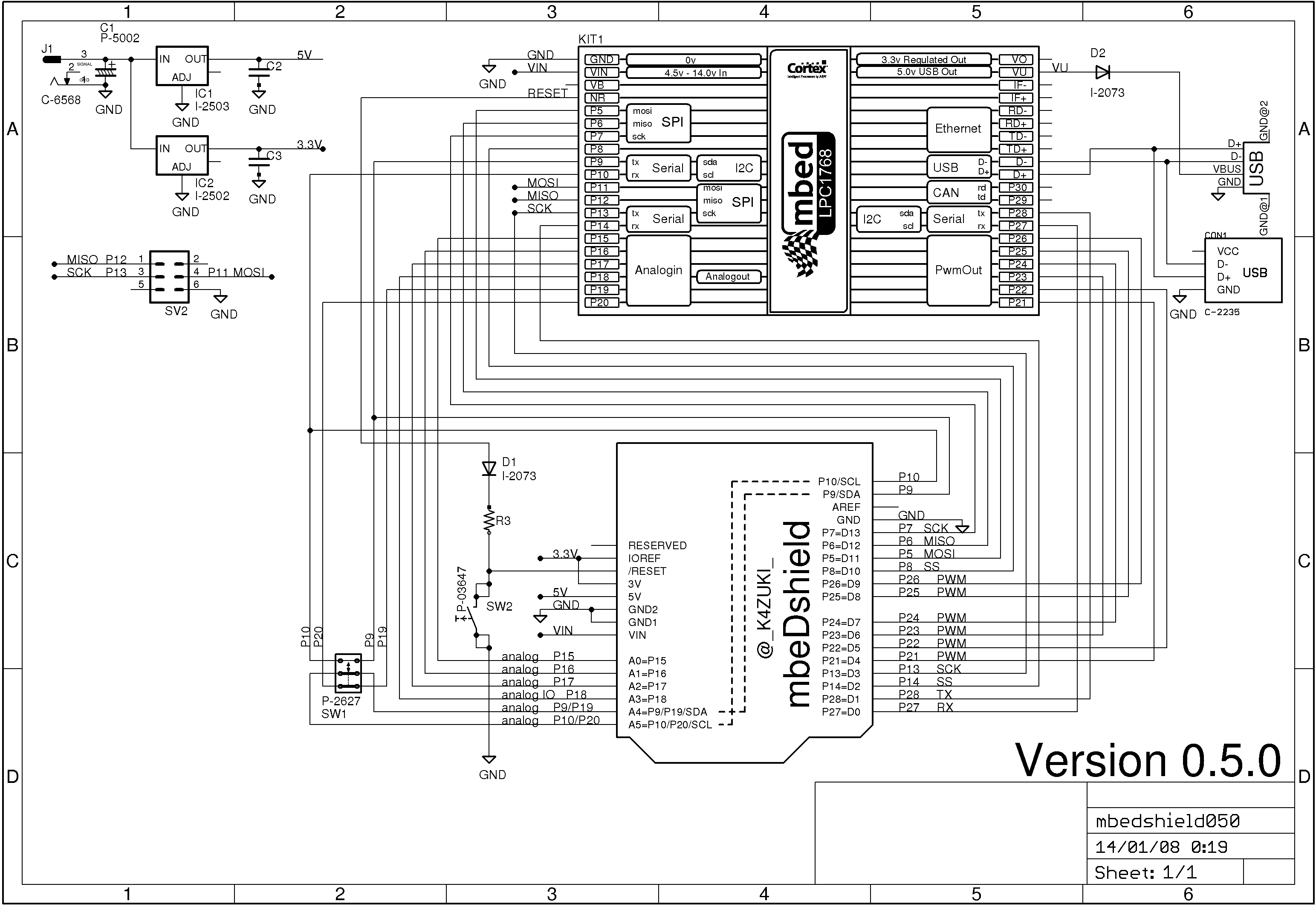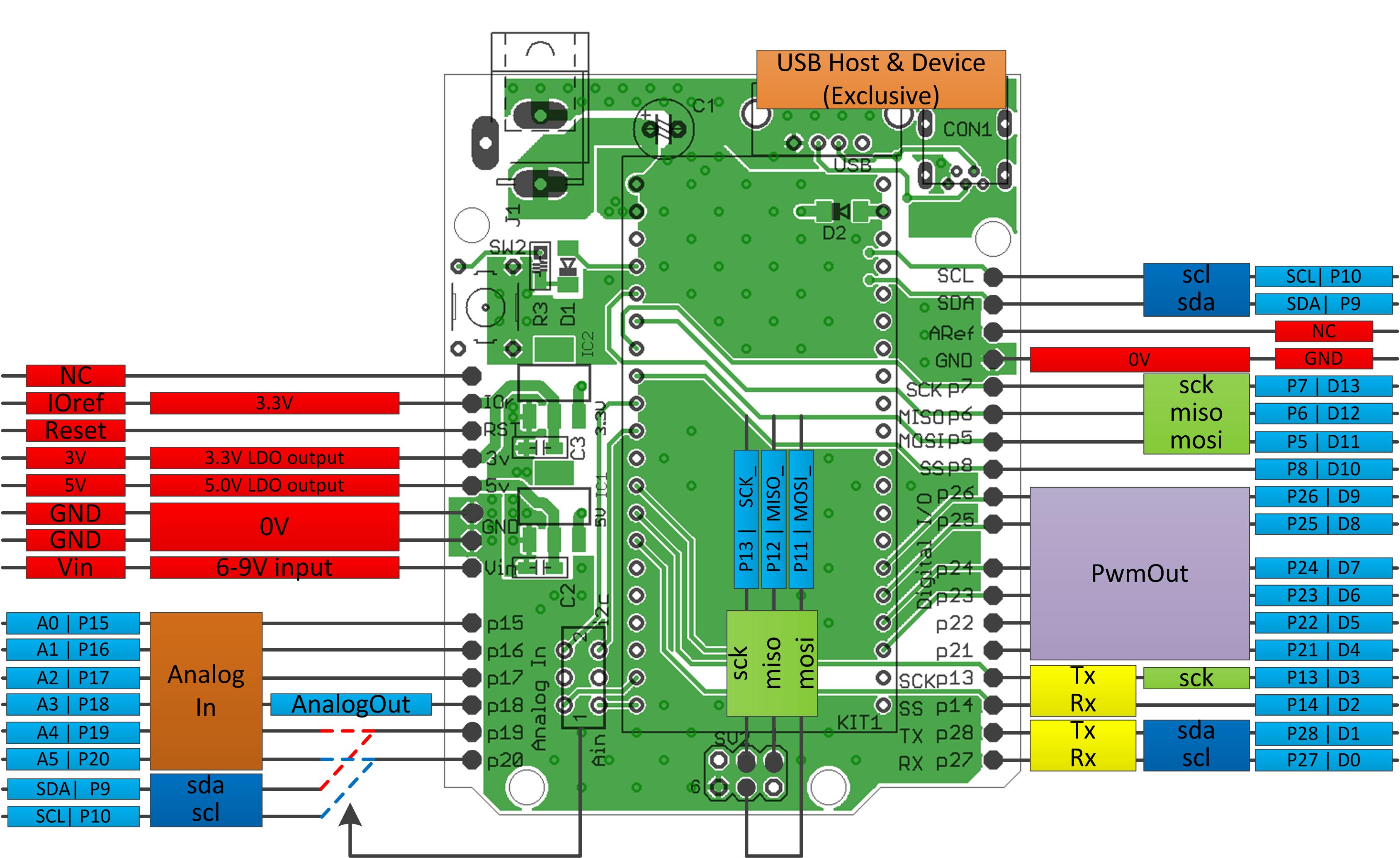The official mbed C/C SDK provides the software platform and libraries to build your applications.
Fork of mbed by
(01.May.2014) started sales! http://www.switch-science.com/catalog/1717/
(13.March.2014) updated to 0.5.0
This is a pin conversion PCB from mbed 1768/11U24 to arduino UNO.
- So if you have both mbed and arduino shields, I guess you would be happy with such a conversion board :)
Photos
- Board photo vvv

- Schematic photo vvv

- Functionality photo vvv

Latest eagle files
PCB >> /media/uploads/k4zuki/mbedshield050.brd
SCH >> /media/uploads/k4zuki/mbedshield050.sch
BIG changes from previous version
- Ethernet RJ45 connector is removed.
- http://mbed.org/components/Seeed-Ethernet-Shield-V20/ is the biggest hint to use Ethernet!
MostALL of components can be bought at Akizuki http://akizukidenshi.com/- But sorry, they do not send parts to abroad
- Pinout is changed!
| arduino | 0.4.0 | 0.5.0 |
|---|---|---|
| D4 | p12 | p21 |
| D5 | p11 | p22 |
| MOSI_ | none | p11 |
| MISO_ | none | p12 |
| SCK_ | none | p13 |
This design has bug(s)
- I2C functional pin differs between 1768 and 11U24.
Fixed bugs here
- MiniUSB cable cannot be connected on mbed if you solder high-height electrolytic capacitor on C3.
- http://akizukidenshi.com/catalog/g/gP-05002/ is the solution to make this 100% AKIZUKI parts!
- the 6-pin ISP port is not inprimented in version 0.4.0
it will be fixed in later version 0.4.1/0.4.2/0.5.0This has beenfixed
I am doing some porting to use existing arduino shields but it may faster if you do it by yourself...
you can use arduino PinName "A0-A5,D0-D13" plus backside SPI port for easier porting.
To do this you have to edit PinName enum in
- "mbed/TARGET_LPC1768/PinNames.h" or
- "mbed/TARGET_LPC11U24/PinNames.h" as per your target mbed.
here is the actual list: This list includes define switch to switch pin assignment
part_of_PinNames.h
USBTX = P0_2,
USBRX = P0_3,
//from here mbeDshield mod
D0=p27,
D1=p28,
D2=p14,
D3=p13,
#ifdef MBEDSHIELD_050
MOSI_=p11,
MISO_=p12,
SCK_=p13,
D4=p21,
D5=p22,
#else
D4=p12,
D5=p11,
#endif
D6=p23,
D7=p24,
D8=p25,
D9=p26,
D10=p8,
D11=p5,
D12=p6,
D13=p7,
A0=p15,
A1=p16,
A2=p17,
A3=p18,
A4=p19,
A5=p20,
SDA=p9,
SCL=p10,
//mbeDshield mod ends here
// Not connected
NC = (int)0xFFFFFFFF
Diff: I2C.h
- Revision:
- 12:f63353af7be8
- Parent:
- 11:1c1ebd0324fa
- Child:
- 20:029aa53d7323
diff -r 1c1ebd0324fa -r f63353af7be8 I2C.h
--- a/I2C.h Fri Aug 28 12:10:11 2009 +0000
+++ b/I2C.h Thu Sep 03 18:03:51 2009 +0000
@@ -24,10 +24,9 @@
* > I2C i2c(p28, p27);
* >
* > int main() {
- * > int address = 0x1234;
+ * > int address = 0x62;
* > char data[2];
- * > i2c.read(address,data,2);
- * > // ...
+ * > i2c.read(address, data, 2);
* > }
*/
class I2C : public Base {
@@ -54,22 +53,28 @@
/* Function: read
* Read from an I2C slave
*
+ * Performs a complete read transaction. The bottom bit of
+ * the address is forced to 1 to indicate a read.
+ *
* Variables:
- * address - 7-bit I2C slave address (0-127)
+ * address - 8-bit I2C slave address [ addr | 1 ]
* data - Pointer to the byte-array to read data in to
* length - Number of bytes to read
- * returns - 0 on success (ack), or 1 on failure (nack)
+ * returns - 0 on success (ack), or non-0 on failure (nack)
*/
int read(int address, char *data, int length);
/* Function: write
* Write to an I2C slave
*
+ * Performs a complete write transaction. The bottom bit of
+ * the address is forced to 0 to indicate a write.
+ *
* Variables:
- * address - 7-bit I2C slave address (0-127)
+ * address - 8-bit I2C slave address [ addr | 0 ]
* data - Pointer to the byte-array data to send
* length - Number of bytes to send
- * returns - 0 on success (ack), or 1 on failure (nack)
+ * returns - 0 on success (ack), or non-0 on failure (nack)
*/
int write(int address, const char *data, int length);
